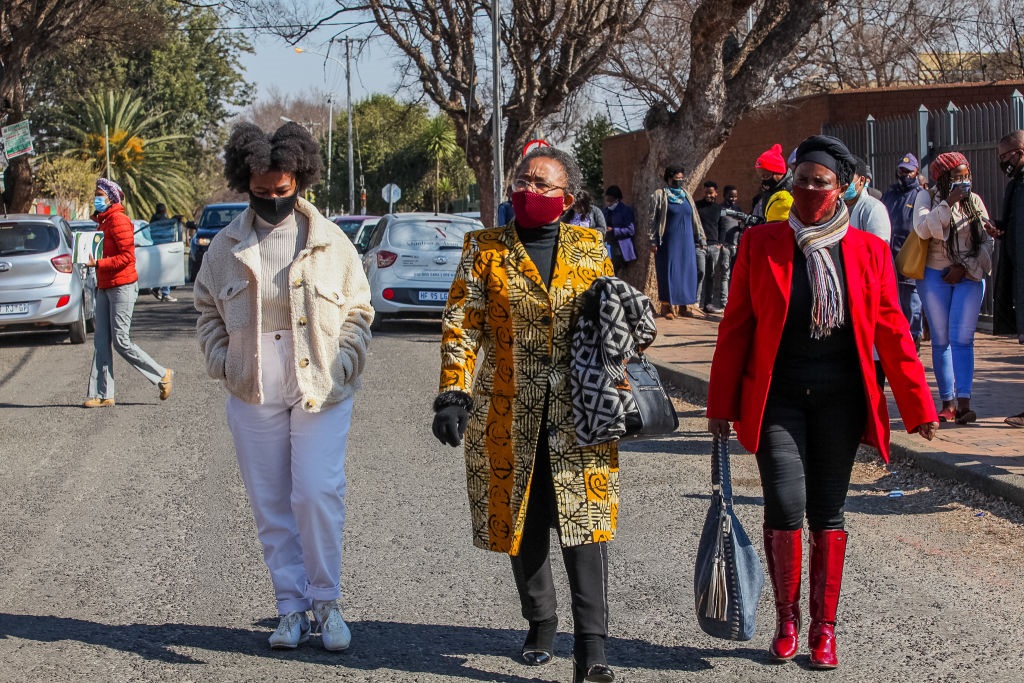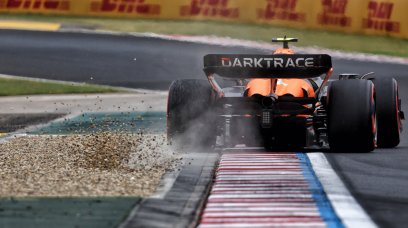Family members, friends and members of the public of Chegafatsa Pule outside the court.
PHOTO: Sharon Seretlo/Gallo Images via Getty Image
- Tshegafatsa Pule’s family are relieved after the Gauteng High Court in Johannesburg refused to grant Ntutuko Shobu leave to appeal his conviction and sentence.
- Pule was found hanging from a tree with a gunshot wound to the chest.
- Shoba was sentenced to life in prison in July, while the hitman he hired was jailed for 20 years.
Convicted killer Tsegafatsa Pule Ntutuka Shoba’s bid to overturn his conviction and life sentence has been rejected by the Gauteng High Court in Johannesburg.
In handing down his decision on Monday, Acting Judge Stewart Wilson did not find there was enough compelling reason to grant Shoba leave to appeal.
“To do so would be nothing more than an exercise in judicial hubris that would only prolong the dull, drawn-out agony that this process has undoubtedly caused Ms. Poole’s family and friends.”
Pule Busi Zuma’s aunt, who visited the scene where her 28-year-old niece was killed, said the justice system had shown it was not going to let the family down. Pule’s uncle Tumisang Katake said the family was happy with the verdict, adding that “the sooner everyone accepts the situation as it is, the better for us.”
Shoba, a former JSE analyst, was jailed for life in July for Pule’s murder.
Her body was found hanging from a tree in Roodepoort in June 2020. There was a gunshot wound to the chest. She was eight months pregnant.
READ | SA’s crime statistics tell the story of a nation at war with its women and children – Ramaphosa
Shoba’s hitman, Muzykaise Malefan, turned state witness and was sentenced to 20 years behind bars.
Wilson said the main question before him is whether there is a reasonable possibility that he could have erred materially, either in gathering the evidence that led to the conclusion he reached or in applying the law to that evidence.
“Only the prospect of an error of this nature will give any prospect of success on appeal,” he said.
Last Friday, Shoba’s lawyer – barrister Louis Barnard – argued that another court might come to a different conclusion.
“The case is open to different interpretations. Another court can consider it and come to a different conclusion,” he argued.
He said:
There was insufficient co-operation in Malefan’s evidence. I have carefully researched, confirmed and found him to be a liar and manipulator.
Bernard also questioned the CCTV footage presented by the defence.
The footage shows Shoba was outside with Pule for three minutes when Malefan, who she believed to be an Uber driver, picked her up.
The lawyer also said that a few minutes was not enough time for Shoba to contribute to the killing that night, arguing that there was a reasonable possibility that another court would have approached the evidence differently.
Barnard said he could find no connection to Shoba orchestrating Pule’s murder.
However, Wilson said on Monday that the “problem” with Barnard’s argument was that it misinterpreted “what I think I did about the incident” and left out “important aspects” of the evidence.
He said:
In my judgment, I did not conclude that Mr Shoba necessarily had to be close enough to the jeep for a long enough period to see and recognize Mr Malefan.
Wilson said he first noted that Shoba admitted there had been a conversation between Poulet and Malefan.
The acting judge said he concluded that Shoba must have recognized Malefan’s voice. According to him, according to Shoba’s version, both men met several times and had known each other for 10 years.
Wilson added that a judge sitting alone in any criminal trial carries a “heavy burden,” and when the trial resulted in a life sentence, that burden was especially acute.
“Throughout this whole process, I was very aware [of] the possibility that I will be wrong, and the consequences of this for everyone involved, will be particularly difficult,” he said.
“I was not sent any significant arguments regarding the prospect of an appeal against the verdict. I said to Mr Barnard that if I was right to find Mr Shoba guilty, I must have been right to sentence him.’
Therefore, he refused to give Shoba an opportunity to appeal both the conviction and the sentence.







